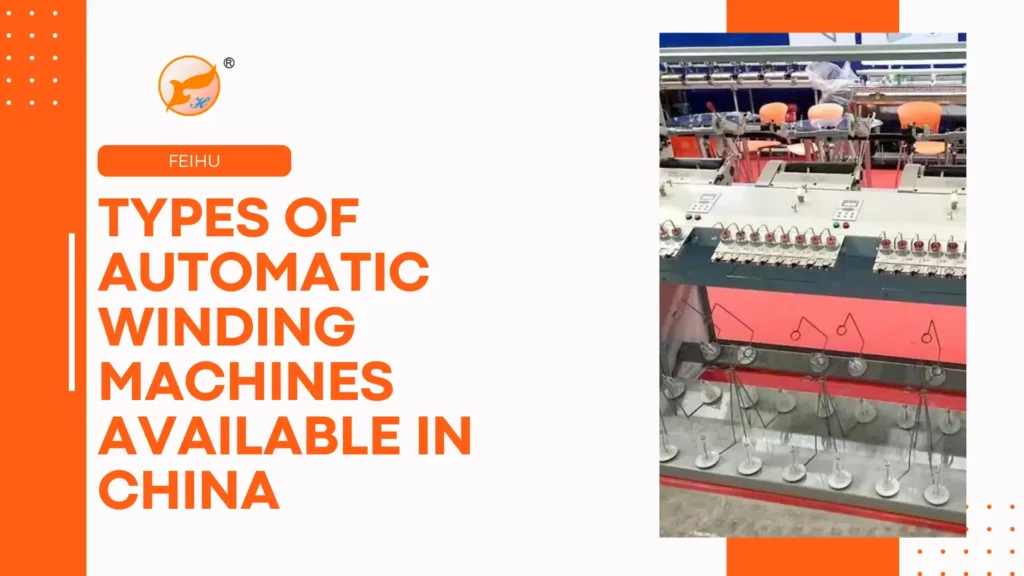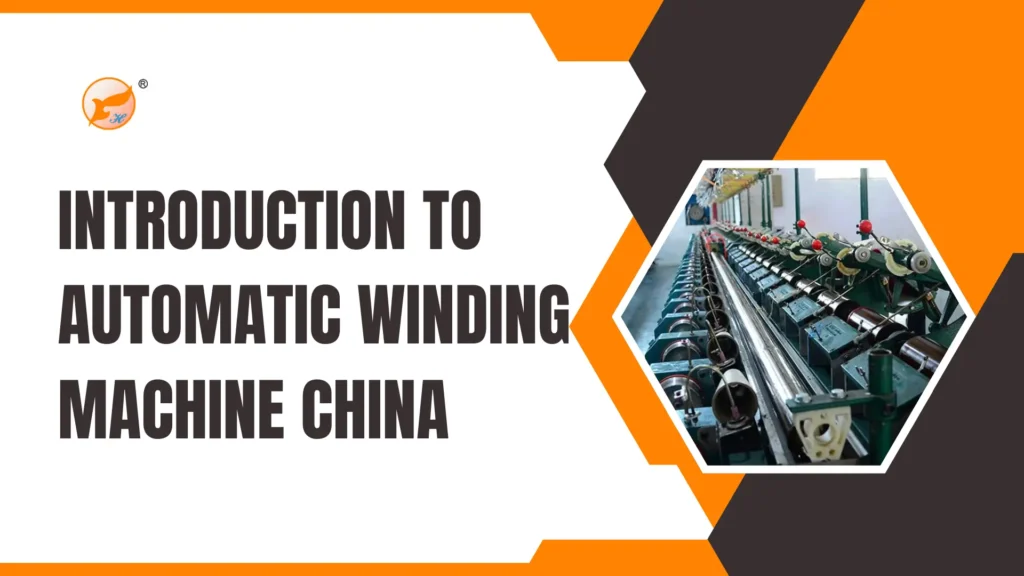Automatic winding machines are kinds of special machinery that automate the winding processes of wires onto an array of substrates such as cores or frames.
These machines are indispensable to manufacturing concerns where precision and speed are primary requirements.
In light of these, such machines ensure uniformity and consistency in every winding, aside from upping production efficiency.
Needless to say, it’s quite impossible to stress how important these automatic winding machines are in this very competitive manufacturing world.
Through the assistance of such machines, manufacturers can easily meet the high demands for production without compromising their standards of quality.
These machines minimize human error since it leads to defects and inconsistency within products.
Learn More:
- Introduction to Automatic Winding Machines in China
- Benefits of Using Automatic Winding Machines in China
Types of Automatic Winding Machines Available in China

Brief Description of Various Types
Several types of automatic winding machines are available in the Chinese market for different requirements of industries. They are as follows:
Coil Winding Machines
The machines intended for coil winding in electronic components do so with accuracy and reliability.
Armature Winding Machines
Suitable for electric motors, the machines work around the peculiar windings that the armature requires.
Transformer Winding Machines
These machines are designed to manufacture coils, which form the very efficiency of any transformer.
Rotary Winding Machines
Built around a rotating mechanism, these machines apply to high-speed winding applications.
Segment Winding Machines
For more specialized operations, these machines undertake winding of segments used in large electrical machinery.
Key Manufacturers and Market Trends
The leading manufacturers in China are innovating in developing more functional and efficient automatic winding machines.
From the market trends, it’s evident that the trend is turning to fully automatic solutions incorporated with smart technologies that can allow real-time monitoring and adjustment.
This is being realized in the manufacturing field to fasten up production and minimize labor costs.
Applications of Automatic Winding Machines in Different Industries

Overview of Industries Employing Such Machines
The applications of automatic winding machines can be found in very many fields, which just goes to show just how versatile and valuable this machinery is. These would include the following primary areas:
Electronics
These machines are needed in the manufacture of inductors, transformers, and other essential parts that must be wound in a specific manner.
Automotive
In automotive industries, they produce motors, sensors, and wiring harnesses, which form an important part of vehicle functionality and safety.
Energy
These machines help, in principle, in making coils for generators and renewable energy devices to help in smoothening energy generation.
Specific Applications in Electronic, Automobile, and Energy Industries
Within the electronic industry, automatic winding machines enable inductors and transformers to be made to the most stringent dimensional and electrical specifications.
In automotive manufacturing, they allow the fabrication of robust components to power a wide variety of in-vehicle applications, further assuring vehicle performance and safety.
They help energy industries to fabricate quality coils that would increase the efficiency and reliability of energy production and distribution systems.
Coil Winding Machines: Features and Applications
Description of Coil Winding Machines
Coil winding machines are specialized tools meant for the production of coils for use in a variety of electrical components.
Most machines can support several sizes and types of wires, allowing diversity in various production lines.
They play an important role in ensuring that the coils are wound with exactness and consistencies that are important in determining the performances of the finished products.
Common Features and Their Applications in Various Products

General features of a coil winding machine include programmable controls that allow the operator to dictate the pattern of the winding and the speed.
Many machines also incorporate automatic tension control so the wire would wind evenly.
Applications for such machines span the ranges of products: inductors for circuit boards, transformers for power distribution, and coils for motors.
The precision afforded by such machines enhances the general quality of the products by adding to their longevity and dependability.
Armature Winding Machines: Types and Uses
Introduction to Armature Winding Machines
Armature winding machines are types of machines designed solely for the fabrication of armatures employed in electric motors.
This class of machines is very important in producing armatures with the exact configuration in wound form, which will positively influence the efficiency of the motors.
They ensure that the coils are wound to exact specifications, something quite critical to motor performance.
Variants of Armature Winding Machines and Their Applications in Motor Manufacturing
There are a number of varieties in armature winding machines available, such as the following:
Manual Machines
These can be used for lower volume manufacturing to have more control over the winding process.
Semi-Automatic Machine
These machines provide a tradeoff between the level of manual control and automation, hence they are suitable for medium-scale production.
Fully Automatic Machine
These machines have been developed to produce at high volume for manufacturing and work to simplify the production process quickly and consistently. They find applications in places where motor components are required in large amounts.
Transformer Winding Machines: Options and Benefits

Introduction to Transformer Winding Machines
Transformer winding machines are complex machines that manufacture coils, which are a significant part of any transformer.
These machines are developed to meet the specific requirements associated with the production of transformers, which ensure high-quality coils according to strict electrical specifications.
Benefits of Using these Machines in the Manufacturing of Transformers
Advantages which are accrued by the usage of transformer winding machines include reduced labour costs because of automation, higher accuracy of coil dimensions, and safety during winding.
Overall, such machines contribute to the reliability and efficiency of transformers due to the tight quality coils produced, making them inescapable in power distribution and regulation.
Rotary Winding Machines: Variants and Functionality
Description of Rotary Winding Machines
Rotary winding machines achieve winding by the rotation of the mechanism onto which the wire is wound while the core remains stationary to allow for effective uniformity in the manner of winding.
It increases the winding speed, therefore suitable for high-volume production lots.
Variants Available and Their Functionality in Production Processes
Variants of rotary winding machines include the single-layer and multilayer machines.
Single-layer machines are normally applied to the less complicated applications, while multilayer machines have been designed to make more complex windings.
These machines have a capability to manufacture parts, for example, transformers and motors that require precision at high speeds.

Segment Winding Machines: Characteristics and Implementations
Segment Winding Machines Description
Segment winding machines serve more specialized applications, those normally entailing the winding of segments for use in large electrical systems.
Efficiency and precision are some of the characteristics boasted of by these machines.
They can, therefore, achieve the winding of more than one segment simultaneously.
Characteristics and Their Implementation in Specialized Applications
Segment winding machines are mainly characterized by their high-class windings, meeting severe specifications.
Implementation of segment winding machines is key in those industries which deal with huge electrical machinery, such as generators and motors.
They ensure preciseness in winding to impart better performance and reliability in large-scale electrical systems.
Comparison of Different Types of Winding Machines
Short Overview of Features and Advantages of Each Type
Each of these types of winding machine has characteristics that suit the applications they fit into:
Coil Winding Machines
They are characterized by precision, hence suitable for electrical components of the same nature or those that require exact dimensions.
Armature Winding Machines
They are universally adaptable, hence fitting into different motor designs and in various scales of production.
Transformer Winding Machines
Find their application in transformer production for their high reliability and assurance of quality.
Rotary Winding Machines
They are suited for production at high speeds and as such are ideal for large-scale manufacturing.

Picking the Correct Machine for the Particular Need
The production volume required, precision of a product, and other specific application needs are considerable factors by the manufacturer in selecting the appropriate winding machine.
By understanding the strengths and capabilities of each machine type, manufacturers will make more informed decisions that match up with operational goals.
Conclusion
The main purpose of automatic winding machines working in conjunction with modern manufacturing is to drive efficiency and quality within manifold industries.
It is also crucial in automating very complicated processes, hence finally enhancing the reliability and performance of a product.
The prospects of the future for automatic winding machines are extremely bright, especially in embedding smart technologies and automation.
AI-controlled controls and further improvements in analytics will lead to even more improvements in machine efficiency and flexibility.
In fact, with manufacturers keen on optimizing production processes, an automatic winding machine will remain crucial in securing sustainable and competitive manufacturing practices.


